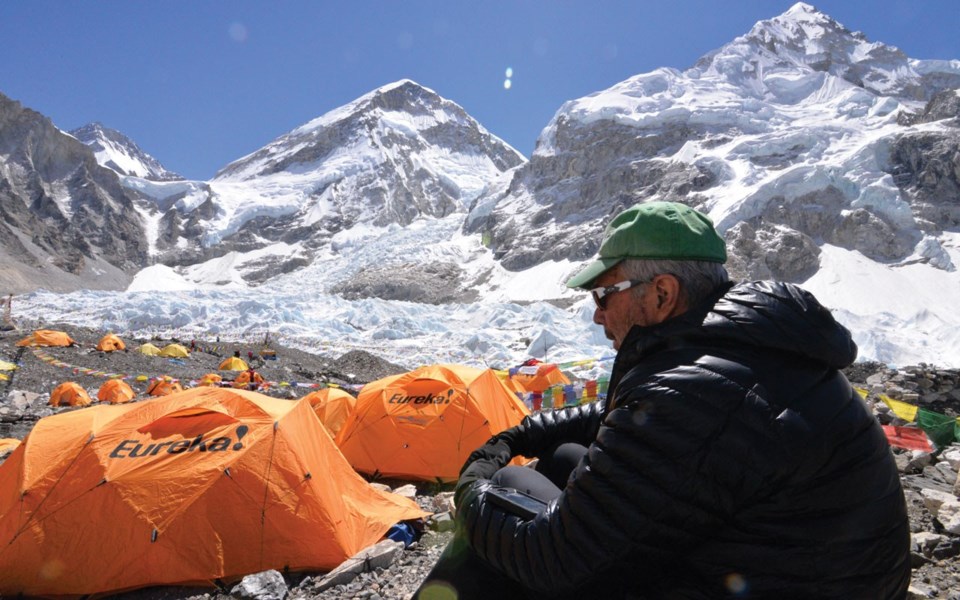The physical and mental challenges of climbing the world's tallest mountain are formidable at any of age.
But for older climbers—who must reckon with the fact that, despite extreme diligence in their training, their bodies have changed—it can be especially taxing.
The experience of one 68-year-old amateur climber is the subject of the new documentary, Accidental Climber, which made its Canadian premier with two sold-out showings at the recent Whistler Film Festival.
The movie tells the story of Jim Geiger's quest to become the oldest American to climb Mount Everest.
When it comes to physical health, Geiger is in extraordinary shape, with thighs the size of tree trunks and a heavy-set physique. His gruelling exercise regime makes up much of the first half of the film.
Geiger, however, came to mountaineering relatively late in his life, in his 40s. A Wisconsin native, who went on to climb Mount Rainier and Mount St. Helens, Geiger made his first international climbing trip at 58 when he climbed Mount Kilimanjaro.
Everest was always a dream—but he never figured he could afford the costs associated with a guided ascent.
Then Geiger had a chance meeting with U.S. investment banker Andy Intrader in the Antarctic. Right on the spot, Intrader agreed to sponsor Geiger's trip.
"Something said to me, 'You need to sit in that chair,'" reflected Geiger, in an interview with Pique. "That changed my life."
Directed by Steven Oritt, Accidental Climber takes an intimate look at Geiger's preparations, family life, and internal struggles as his body attempts to adjust to the high-altitude conditions.
On a multi-day hike from Lukla to the Everest base camp, Geiger appears worn out and short of breath in the documentary.
He did not expect to have such difficulty adjusting.
"I wasn't quite sure what was happening or why I wasn't acclimating," said Geiger. "It was a little frustrating, but then I realized, well, this may be just what it's like at age 68. I had to come to accept it."
After a perilous first attempt up the the Khumba Icefall (which sits above base camp), Geiger returns to the camp with the intention of further acclimating.
Then disaster hit—one of the worst, in fact, in climbing history.
On April 18, 2014, seracs on the western spur of Mount Everest failed, resulting in an ice avalanche that killed 16 Sherpas who were navigating the Khumbu Icefall.
The extraordinary event shook Geiger's resolve, leading to a highly emotional phone call with his daughter.
"Viewing those deaths and knowing how many people died—and knowing how much they meant to us as a climbing community—it was a very difficult time for me," recalled Geiger.
"I was so concerned about my safety, the safety of my climbing buddies and in getting back home. My family was freaking out—they couldn't know right away if I was safe or not."
The disaster led to a dramatic pivot for Oritt, who accompanied Geiger to base camp along with high-altitude cinematographer Thom Pollard.
The filmmakers were able to capture riveting shots of the political upheaval the avalanche engendered, with Sherpas calling for longstanding demands from government and a shut down of climbing of the infamous mountain altogether.
While Oritt does a great job weaving these storylines into the movie, he said that he always wanted to keep Accidental Climber centred on his main character, Geiger.
(Others, including the filmmakers behind Jennifer Peedom's 2015 award-winning documentary Sherpa, are better placed to tell the Sherpas' story, he added).
"I really focused more on Jim, as a character," he said. "I view the film like a character study, more so than a harrowing adventure-sports film like Free Solo."
Oritt's film, however, begs some difficult questions. Like, was Geiger ready for such an extreme climb in the first place?
"In retrospect, I think it's easier to kind of take that perspective ... seeing how much he was struggling," said Oritt.
"But I will say that before we got over there, I was very, very confident that [Geiger] was going to achieve his goal. He exudes so much confidence, and I knew how much work he was putting into the training."
For Geiger, watching the film brings back a host of emotions.
In the end, he said, he hopes his story can help inspire others to chase their dreams, no matter what age they are.
"We are what we think," he said. "If we think we're going to get decrepit and age poorly, we're going to be decrepit and age poorly. But if we think we're going to age well—and we keep that positive attitude and that positive desire—we can age well, and we will age well."
A desire to age well fosters positive choices, like eating healthy food and exercising regularly, he said.
"I'm still in awe of the whole experience," said Geiger of the opportunity he was given. "This was lined up by my God and the universe."
Accidental Climber is currently on the festival circuit. Its route for distribution/streaming is still to be determined. To find out more, check out facebook.com/accidentalclimber.




